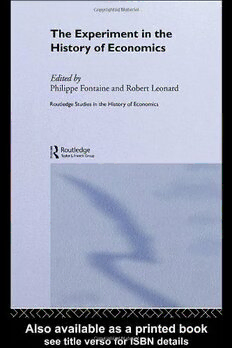
The Experiment in the History of Economics (Routledge Studies in the History of Economics) PDF
163 Pages·2005·1.034 MB·English
Most books are stored in the elastic cloud where traffic is expensive. For this reason, we have a limit on daily download.
Preview The Experiment in the History of Economics (Routledge Studies in the History of Economics)
Description:
Throughout the history of economic ideas, it has often been asserted that experimentation is impossible, yet, in fact, history shows that the idea of ‘experimentation’ has always been important, and as such has been interpreted and put to use in many ways. Rich in historical detail, the essays in this topical volume deal with such issues as laboratory experimentation, the observed transition from a post-war economics to a contemporary discipline, the contrasting positions of Friedrich Hayek and Oskar Morgenstern, the socio-economic experiments proposed by Ernest Solvay and Knut Wicksell, and a rigorous examination of the way in which economic models can or cannot be construed as valid experiments producing useful knowledge. A testament to the variety of ways in which experimentation has been of importance in the creation of economic knowledge, these wide-ranging essays will interest those seeking to expand their historical understanding of the discipline, be they theorists, historians, philosophers, advanced students or researchers.
See more
The list of books you might like
Most books are stored in the elastic cloud where traffic is expensive. For this reason, we have a limit on daily download.
